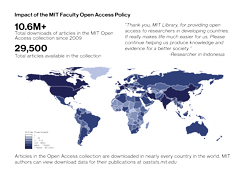
| Vol.
XXXI No.
1 September / October 2018 |
| contents |
| Printable Version |
MIT Open Access Task Force
Shares White Paper on OA Landscape
In July 2017, Provost Martin Schmidt, in consultation with the Vice President for Research, the Chair of the Faculty, and the Director of Libraries, appointed an ad hoc task force on open access to MIT’s research. Convening the task force was one of the 10 recommendations presented in the 2016 preliminary report of the Future of Libraries Task Force. In addition, the 2013 Report to the President on MIT and the Prosecution of Aaron Swartz raised the question as to whether MIT should strengthen its activities in support of open access to the research and educational contributions of the MIT community. As a result of subsequent discussions held with the faculty and relevant committees, this task force has been charged to take up this question.
The open access task force is co-chaired by Class of 1922 Professor of Electrical Engineering and Computer Science Hal Abelson and Director of Libraries Chris Bourg, and is composed of a diverse and multi-disciplinary group of faculty, staff, postdocs, and graduate and undergraduate students. Throughout the 2017-18 academic year, task force members consulted widely with domain experts across campus and beyond to develop an understanding of current local, national, and global practices, policies, and possibilities. The task force is pleased to share a white paper, “Open Access at MIT and Beyond: A White Paper of the MIT Ad Hoc Task Force on Open Access to MIT's Research,” with the community (read online at https://open-access.mit.edu).
The task force is in the process of developing a set of draft recommendations across a wide array of scholarly outputs, including journal articles, scholarly monographs, data, computer code, and educational materials, and will be gathering community feedback on those recommendations throughout the coming academic year. We invite MIT community members to offer their ideas of new, updated, or revised policies or practices that might further the Institute’s mission of disseminating the fruits of its research and scholarship as widely as possible. Ideas can be submitted via the task force idea bank, via email to the task force, or at upcoming community forums (details forthcoming).
| Back to top | |
| Send your comments |
| home this issue archives editorial board contact us faculty website |
